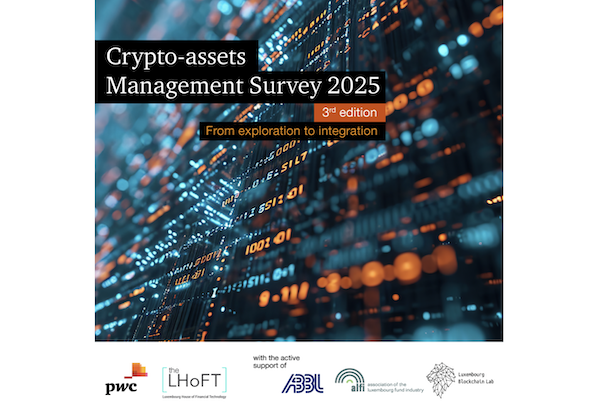 Credit: LHoFT
Credit: LHoFT
On Wednesday 23 April 2025, the Luxembourg House of Financial Technology (LHoFT) and PwC launched the third edition of the Crypto-Assets Management Survey Findings during an event held at PwC’s premises.
The latest survey findings suggest that crypto-assets have firmly entered the financial mainstream in Luxembourg. According to the report, 81% of respondents now consider crypto-assets strategically important for Luxembourg’s financial future - up from 71% two years ago and thus reflecting a sector in transformation.
Conducted with the support of the Association of the Luxembourg Fund Industry (ALFI), the Luxembourg Bankers’ Association (ABBL) and the Luxembourg Blockchain Lab, the study gathered responses from over 130 financial industry professionals. It revealed a notable shift in perception: just 19% of participants still view crypto as a niche market, compared to 44% in 2023, while customer demand for crypto-related products has more than doubled since the previous edition.
Particularly striking is the surge in retail banking interest in crypto-assets, which grew from just 5% in 2023 to 30% in 2025 - an indication of the sector’s broader acceptance.
"The crypto-assets landscape in Luxembourg is showing signs of promise. Compared to the previous edition of the survey, which took place during the so-called 'crypto winter' of early 2023, this edition shows growing interest in crypto-assets among all segments of the Luxembourg financial centre. This shift is partly driven by the EU Markets in Crypto-Assets Regulation (MiCA) which established a robust regulatory framework that protects investors and promotes market integrity. Looking ahead, the survey's findings are clear: Luxembourg has the potential to become a key jurisdiction for serious crypto-asset service providers under MiCA.", explained Dariush Yazdani, PwC Partner and Head of Global AWM & ESG Research Centre.
The report highlighted tokenisation as the driving force behind institutional adoption, with nearly half (47%) of respondents already offering or planning to offer tokenised products. Industry professionals cited instant settlement (80%) and round-the-clock trading (60%) as the most transformative features of these new assets.
Oriane Kaesmann, Research Manager at LHoFT, noted: “Tokenisation marks a deep structural evolution in finance. The underlying infrastructure shows that this system is truly interoperable at a global level. Round-the-clock markets are no longer novelties, they are the new normal; and institutions internalising this shift are positioning themselves to lead the capital markets in the next decade.”
Nevertheless, challenges remain. Limited local expertise (64%) and internal concerns around risk appetite and reputational impact (63%) are slowing broader adoption. While the number of respondents who see infrastructure as insufficient has declined from 73% to 59%, technological gaps persist.
More than half of those surveyed reported having initiated a gap analysis to comply with MiCA and 21% are actively pursuing Crypto-Asset Service Provider (CASP) licensing.
Nasir Zubairi, CEO of LHoFT, concluded: “This year’s survey confirms that crypto-assets are moving from the periphery into the heart of financial strategy. Luxembourg is exceptionally well-placed to lead—our regulatory pragmatism, cross-border expertise and infrastructure are built for this transition. With tokenisation gaining ground and MiCA offering the clarity institutions need, we are poised to seize the opportunity. We must continue to foster talent, build confidence and act with strategic purpose to secure Luxembourg’s role at the forefront of this digital era.”








